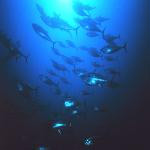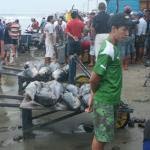
In the 1970s, Carl Safina fished off the U.S. Atlantic coast for bluefin tuna, a majestic warm-blooded predator that travels at highway speeds and can weigh as much as 650 kilograms.
"I've seen acres and acres of bluefin tuna at the surface, exploding through the surface and chasing crayfish." Safina says it wasn't a question of whether the fishermen would catch one. "When the fishing was good, we just assumed we would be going out and catching tuna."
Diminishing species
Over the last 40 years, though, the global adult bluefin tuna population declined by over 80 percent. The trend has been driven by industrial overfishing, coupled with surging demand, largely from Japan, which consumes 80 percent of the world's supply.
In 1969, the International Commission for Conservation of Atlantic Tunas was charged with setting quotas and managing healthy tuna populations. They've failed in that mission, says Carl Safina, now president of the conservation group, Blue Ocean Institute.

"In the last ten years, with the fish on the western side of the Atlantic pretty much demolished, a lot of the focus of the fishing has intensified on the eastern side of the Atlantic and the Mediterranean and that population is now falling apart," says Safina. "And the Tuna Commission has demonstrated on an annual basis its complete inability to control the fishing."
The Convention on International Trade in Endangered Species or CITES is a global treaty that protects 30,000 species of animals and plants. The CITES Conference in Doha, Qatar later this month will consider the proposed commercial trade ban on bluefin tuna.
Game changer
The Obama administration announced support for the measure this week.
Susan Lieberman, director of International Policy at the Pew Environment Group, applauds the decision which she says could be a game changer for the species.
"And it's extremely important in shifting what needs to happen, and we certainly hope that the administration leverages its leadership between now and the CITES meeting to encourage other governments to follow this lead," says Lieberman. Including the 27-member European Community, which Lieberman expects to vote as a bloc in support of the ban. As the world's leading consumer, Japan opposes the measure, and could take a reservation or opt out of the treaty and continue fishing. However, since Japan depends largely on tuna imports, Lieberman says the focus will be on ensuring other countries don't opt out as well to supply the Japanese market.
"If Japan, unfortunately, takes a reservation they still have to have a country they can import from because they can only then import from another CITES country that has a reservation. The U.S. will not take one. The EU will not take one. And we believe that the EU will exert sufficient pressure on the North African countries to do the same."

Rebound
The ban would not affect the popular albacore or yellowfin tuna that end up in cans. The bluefin tuna is usually served as sashimi or sushi.
Carl Safina of Blue Ocean Institute's says he expects that with the commercial bluefin fishery ban, the species will recover. "You would see something right away and then probably that growth will begin to increase at an accelerated rate, and in a decade you would see very substantial recoveries," says Safina.
In addition to the bluefin tuna ban, delegates at the Doha meeting will consider proposals to put trade controls on eight threatened species of shark and red and pink corals.
crayfish: a shellfish like a small lobster, that lives in rivers and lakes and can be eaten, or one like a large lobster, that lives in the sea and can be eaten 淡水螯虾;海水大龙虾
albacore: 青花鱼科的海产鱼
Quotas cut as scientists warn that southern bluefin tuna stocks close to collapse
An international treaty targets fishing abuses
Study finds some ocean fisheries are recovering
Australia threatens Japan with court action over whale hunt
(来源:VOA 编辑:陈丹妮)
